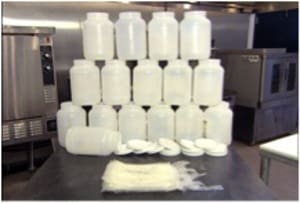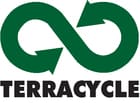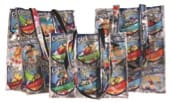Kermit the Frog famously fretted that it wasn’t easy being green, but more companies are finding innovative ways to produce items in a more sustainable fashion or to dispose of their empty food containers more responsibly. Other companies have developed ways to re-purpose former packaging materials and reduce the amount of packaging ending up in landfills. All are motivated to ramp up their efforts to go green.
Consumers increasingly say that they want to see their environmental concerns matched with action by the companies that make and sell the products they buy. Those consumers will search for and spend more with businesses that can show proof of reducing carbon footprints, lowering emissions or using sustainable or recyclable materials. Two companies in particular have taken this to heart. One has focused on packaging development innovation. The other, on what to do with packaging once it’s used.

Kraft Mayo: From jugs to pouches
Kraft Foods has long supplied its Kraft Mayonnaise to the foodservice industry in plastic gallon jugs. In 2008, the company introduced the Easyprep pouch, a pliable, portion-sized cryovac pouch that allows for easy removal of the mayonnaise product from the bag and virtually eliminates product waste. The pouches require 40% less storage space than its plastic bottle equivalent. The smaller packaging results in less solid waste and lower disposal costs for operators, who have responded to it enthusiastically.
Terence Thomas, Sr. Associate Business Manager for Spoonables at Kraft Foodservice explains, ‘Once operators get a chance to interact with our Easyprep products they instantly recognize the benefits. You can easily use all of the contents of the package, and the pouches use 95% less solid waste than your standard gallon jugs.’
Other Kraft brand teams have delivered on the company’s commitment to eco-friendly practices as well. The Kraft plant in Lowville, NY installed equipment in its production line for Philadelphia® brand cream cheese. The equipment converts the waste (whey) from product production and converts it into methane gas. This result is replacement of about 30% gas usage and elimination of nearly 100% of whey land-spreading. This annual energy savings is an astounding 87,000 mmBTUs or enough energy to head 1,100 average size houses for one year!
‘They see opportunity where others see garbage.’
It’s not just how the packaging is made that’s important, but also how it’s disposed of. What habitually has been dumped as trash is being reborn as material for the production of new items, thanks to a 10-year-old company started by a Princeton dropout with a vision.

TerraCycle, headquartered in Princeton, NJ, has one mission: Outsmart Wasteâ„¢. The company works with manufacturers to develop innovative uses for all their waste streams and to make products from those waste streams. The result is less waste going into landfills and a company whose mission it is to do ‘good for the planet, good for people and good for the bottom line.’ One of the company’s main material sources is used food packaging.
The used packaging is collected by ‘brigades’ – national collection programs created in partnership with major CPG companies such as Frito Lay, Pepsi, Mars and others that work with schools and non-profits to collect cookie wrappers, chip bags, drink pouches and yogurt cups.

The used packaging is ‘upcycled’ into affordable, high-quality products. The organizations that collect packaging receive $0.02 to $0.05 for each piece of packaging collected, depending on its type. Since 2007, nearly $507,000 has been given to participating school and non-profit brigades which in total have collected over 1.2 billion individual packaging waste units.
The items are sold through participating retailers such as Target, Wal-Mart, and The Home Depot, or on a TerraCycle-affiliated website, shoponlygreen.com.
The Capri Sun Brigade
One of the largest brigades is also one of the first. The Capri Sun Brigade, formed in February, 2008, in partnership with Kraft Foods, collects about 5 million of the brand’s juice pouches each month from 3,000-plus groups. The empty bags are cleaned, flattened and sewn together to produce the ‘fabric’ that is cut and sewn to create items such as tote bags, pencil cases, backpacks and shower curtains.

In addition to Capri Sun totes and pencil cases, TerraCycle corporate partnerships produce similar items featuring other brands. Some of these include, clip boards and coasters made from recycled computer circuit boards, flower pots and waste baskets, and memo boards made from recycled wine corks.
For more information on where to find finished products, or how to participate in or create your own brigade, visit http://www.terracycle.net . You may find that it’s easy, fun—and fashionable—to be green.
Green Tidbit – In 2008, about 12.7% of the total municipal solid waste generated in the U.S. was food waste, a total of 32 million tons. Less than 3% of that was recovered and recycled. The remaining 31 million tons made its way into landfills or incinerators. SOURCE: United States Environmental Protection Agency Office of Resource Conservation and Recovery


